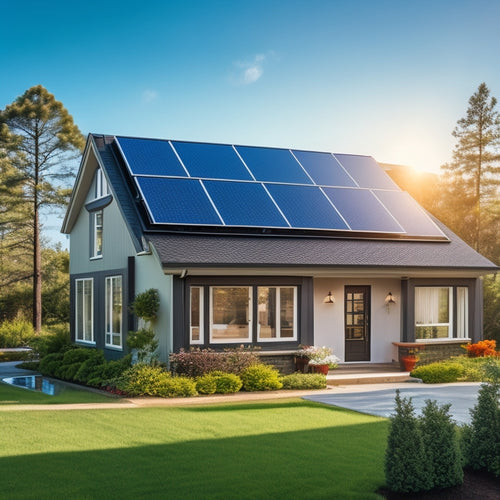
3 Solar Power Savings Strategies to Transform Finances
Share
You can change your finances by leveraging three solar power savings strategies. First, maximize energy efficiency gains through energy audits and smart technology, leading to optimized consumption and increased savings. Second, reduce your monthly utility bills by up to $400 with a 10 kW system, and take advantage of incentives like tax credits to reduce upfront costs. Finally, invest in long-term value creation, with potential annual energy savings of up to $500 over a 25-year lifespan, and a 17% increase in property value. Now, uncover the specifics of each strategy and how they can add up to significant financial benefits.
Key Takeaways
- Conducting energy audits and leveraging smart technology enables data-driven decisions to maximize energy efficiency gains and reduce waste.
- Investing in solar power can significantly lower monthly utility bills, with potential savings ranging from $125 to $400 per month depending on system size.
- Solar installations can increase property value by up to 17%, while government incentives and tax credits offset installation costs for renewable energy.
- By reducing reliance on traditional energy sources, solar power can lead to financial transformation through reduced consumption and incentives.
- With minimal maintenance required, solar panels can provide annual energy savings of up to $500 per year over a 25-year lifespan.
Maximizing Energy Efficiency Gains
By optimizing your energy usage, you can considerably amplify the savings generated by your solar power system. Conducting energy audits is an essential step in identifying areas of inefficiency in your home or business.
These audits provide a thorough analysis of your energy consumption, highlighting opportunities to reduce waste and maximize efficiency. Implementing smart technology, such as smart thermostats and energy monitors, can also help you track and control your energy usage in real-time.
This data-driven approach enables you to make informed decisions about your energy consumption, reducing unnecessary waste and optimizing your solar power system's performance.
By combining energy audits and smart technology, you can streamline your energy usage, increase your savings, and maximize the returns on your solar power investment.
With a data-driven approach, you can access the full potential of your solar power system and take control of your energy efficiency.
Reducing Monthly Utility Bills
One significant advantage of solar power is that it can drastically slash your monthly utility bills, providing a tangible return on investment. By utilizing renewable energy, you can reduce your reliance on the grid and lower your energy consumption. This, in turn, leads to significant cost savings over time.
To give you a better idea of the potential savings, here's a breakdown of the average monthly utility bill reductions based on different solar panel system sizes:
| System Size (kW) | Average Monthly Savings | Total Savings (5 years) |
|---|---|---|
| 3 kW | $125 | $7,500 |
| 5 kW | $200 | $12,000 |
| 10 kW | $400 | $24,000 |
Additionally, you may be eligible for solar incentives, such as the federal solar investment tax credit (ITC), which can further reduce your upfront costs. By reducing your energy consumption and taking advantage of these incentives, you can maximize your savings and change your finances with solar power.
Investing in Long-Term Value
As you weigh the benefits of solar power, it's essential to reflect on the long-term value it brings to your property and finances.
Investing in solar technology is a smart move, as it provides a significant return on investment over the years. Not only does it reduce your reliance on traditional energy sources, but it also enhances your property's value and appeal.
Here are 4 key ways solar power investing pays off in the long run:
-
Increased Property Value: Installing solar panels can elevate your property's value by up to 17%, making it more attractive to potential buyers if you decide to sell.
-
Renewable Energy Incentives: The government offers tax credits and rebates to homeowners who invest in renewable energy, offsetting the initial cost of installation.
-
Energy Savings: Solar power can save you up to $500 per year on your energy bills, adding up to significant savings over the system's 25-year lifespan.
- Low Maintenance Costs: Solar panels require minimal upkeep, ensuring you won't be hit with surprise repair costs down the line.
Frequently Asked Questions
Can Solar Panels Be Installed on a Rented Property?
You'll need to review your lease agreements to understand renter rights, as installing solar panels on a rented property typically requires landlord approval, and some agreements may prohibit modifications or have specific guidelines.
How Do Solar Panels Affect Property Resale Value?
You'll enhance property resale value by installing solar panels, as they increase appeal in the property market, with data showing a 4.1% increase in sales price, thanks to the solar panel benefits of reduced energy costs and environmental appeal.
Are There Any Government Incentives for Solar Power?
As it happens, you're in luck! You can claim federal tax credits of up to 26% of your solar panel system's cost, and, coincidentally, many states offer additional rebates, increasing your savings and making the switch to solar even more appealing.
Can I Install Solar Panels Myself to Save Money?
You can attempt a DIY installation, but consider the cost considerations: incorrectly installed panels can void warranties, decrease efficiency, and even pose safety risks, potentially offsetting any initial savings, so weigh the benefits against your technical knowledge.
Do Solar Panels Require Frequent Maintenance?
As you gaze at your newly installed solar panels, you wonder about maintenance. Fortunately, they're designed to last around 30 years with minimal upkeep; a quick routine cleaning every 6-12 months will keep them humming, ensuring peak energy harvesting.
Related Posts
-

What Solar Panels Work Best With EVS Online?
When shopping for solar panels online to power your electric vehicle, look for high-efficiency models that can withst...
-

Top 10 Tips for Buying Car Accessories Online
When purchasing car accessories online, you should take proactive steps to avoid low-quality or incompatible products...
-

Solar Power Units Perfect for Homes
You're considering installing a solar power unit in your home, a decision that can notably reduce your reliance on tr...


